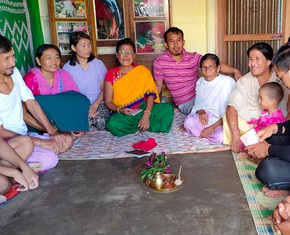The views expressed in our content reflect individual perspectives and do not represent the authoritative views of the Baha'i Faith.
An American congressman once asked Abdu’l-Baha “How can I best serve my country?” The answer he received—which probably surprised him, and might surprise you—can apply to us all:
Abdu’l-Baha’s counsel to a highly placed official in its government comes to mind, with peculiar appropriateness and force: You can best serve your country if you strive, in your capacity as a citizen of the world, to assist in the eventual application of the principle of federalism, underlying the government of your own country, to the relationships now existing between the peoples and nations of the world. – quoted by Shoghi Effendi in The Advent of Divine Justice, p. 87.
That universal model—a federated union of all the world’s nations into one democratic global commonwealth—represents the main social goal of the Baha’i teachings:
Be united, O kings of the earth, for thereby will the tempest of discord be stilled amongst you, and your peoples find rest, if ye be of them that comprehend. Should any one among you take up arms against another, rise ye all against him, for this is naught but manifest justice. … Should anyone seek refuge with you, extend unto him your protection and betray him not. Thus doth the Pen of the Most High counsel you, as bidden by Him Who is the All-Knowing, the All-Informed. – Baha’u’llah, The Summons of the Lord of Hosts, p. 94.
The most glorious fruit of the tree of knowledge is this exalted word: Of one tree are all ye the fruit, and of one bough the leaves. Let not man glory in this that he loveth his country, let him rather glory in this that he loveth his kind. – Baha’u’llah, Tablets of Baha’u’llah, pp. 127-128.
The people of the future will not say, “I belong to the nation of England, France or Persia”; for all of them will be citizens of a universal nationality—the one family, the one country, the one world of humanity—and then these wars, hatreds and strifes will pass away. – Abdu’l-Baha, The Promulgation of Universal Peace, p. 19.
The principle of federalism calls for a compound model of government, combining a federated or central agency that shares power with smaller regional governments in a single system. Federalism strikes a middle-way balance between a de-centralized confederation—a loose association of regional or local governments—and a fully-centralized unitary state, where all power and authority rests with the central government. The term “federal” comes originally from the Latin word foedus, which means covenant, pact or treaty.
In the United States, federalism famously established a relationship of parity between individual states and the central government—a “division of powers,” in which the federated states and their central government both had certain rights and privileges.
More than a century ago, when Abdu’l-Baha gave his advice to the Congressman, only a few of the world’s governments employed a federalist system. Today, many of the world’s most stable, successful large governmental structures use federalism as their model—Canada, India, Germany, Australia, Switzerland, Brazil, the United States and the European Union, to name just a few.
Baha’is believe that a new system of federated nations joined together in world unity can bring an end to warfare, stop the expenditure of enormous sums on weapons and armies, increase the world’s prosperity, reduce taxation, and save the lives of millions of people who die from starvation, lack of proper health care, poverty and armed conflict:
If the learned and wise men of goodwill were to impart guidance unto the people, the whole earth would be regarded as one country. – Baha’u’llah, Tablets of Baha’u’llah, p. 172.
To many, this kind of global federation might sound like an unattainable, idealistic dream—but the world has already taken several of the initial steps on the path toward global governance:
- Humanity has established, all in the past three-quarters of a century, a broad spectrum of international governmental organizations—starting with the United Nations in 1945, but only beginning there. Countries have increasingly recognized their interdependence and created the European Union, NATO, the African Union, The Arab League, the Commonwealth of Nations, the Association of South East Asian Nations, and many, many more.
- Treaties, pacts and multinational agreements like the new Global Compact for Safe, Orderly and Regular Migration have been proposed, debated, voted on and signed by the overwhelming majority of the world’s nations, pointing toward an increasing level of international coordination on many different worldwide issues, including immigration and refugees.
- The world now has a growing, recognized and increasingly important system and practice of recognized international law, which includes the International Court of Justice and the International Criminal Court, with a binding body of law based on the Universal Declaration of Human Rights.
- A unified global financial market in goods and services has rapidly developed and become increasingly important to the entire world. Efforts to regulate that supranational market, with institutions like The World Bank and the World Trade Organization, still tend to unjustly privilege the developed nations of the world over others, but change has begun to occur.
- Our global media, with digital and satellite communications, now allows most of the world’s people to receive information they never had access to before.
- The global citizenship movement, with flourishing grassroots groups like the World Federalist Movement, Citizens for Global Solutions and One World Trust. encourages people in every part of the world to become engaged global citizens.
- The national governments of the world have begun to recognize that our global environmental problems—climate change, air and water pollution, species extinction, etc.—have no national boundaries, and require unified planetary solutions. The 2015 Paris Climate Accords—the first international treaty signed by every nation on Earth—amply demonstrates this fact.
All of these factors and more have generated movement toward the democratic reform of the United Nations itself. In 2007, the Campaign for the Establishment of a United Nations Parliamentary Assembly (CEUNPA) began, initiated by the Committee for a Democratic United Nations.
This important development, which echoes Baha’u’llah’s call for a world parliament, would add a democratic, globally representative Parliamentary Assembly to the United Nations, allowing member nations’ elected representatives to have equal decision-making power in the U.N.’s deliberations. Eventually, the Campaign proposes direct election of U.N. Parliament members on a worldwide basis. So far the CEUNPA has the support of more than 350 non-governmental organizations (NGOs) and 850 parliamentarians from 140 countries.
Every one of these recent developments have their origins in the Baha’i teachings and principles:
… the ages of darkness have passed away, and the century of light has come. Ignorant prejudices are being dispelled, and the light of unity is shining. The differences existing between nations and peoples will soon be annulled, and the fundamentals of the divine religions, which are no other than the oneness and solidarity of the human race, are being established. For thousands of years the human race has been at war. It is enough. Now let mankind, for a time at least, consort in amity and peace. Enmity and hatred have ruled. Let the world, for a period, exercise love. For thousands of years the nations have denied each other, considering each other as infidel and inferior. It is sufficient. We must now realize that we are the servants of one God, that we turn to one beneficent Father, live under one divine law, seek one reality and have one desire. Thus may we live in the utmost friendship and love, and in return the favors and bounties of God shall surround us; the world of humanity will be reformed; mankind, enjoy a new life; eternal light will illumine, and heavenly moralities become manifest.
Then divine policy shall govern the world, for the divine policy is the oneness of humanity. – Abdu’l-Baha, The Promulgation of Universal Peace, p. 65.
















Comments
Sign in or create an account
Continue with Googleor